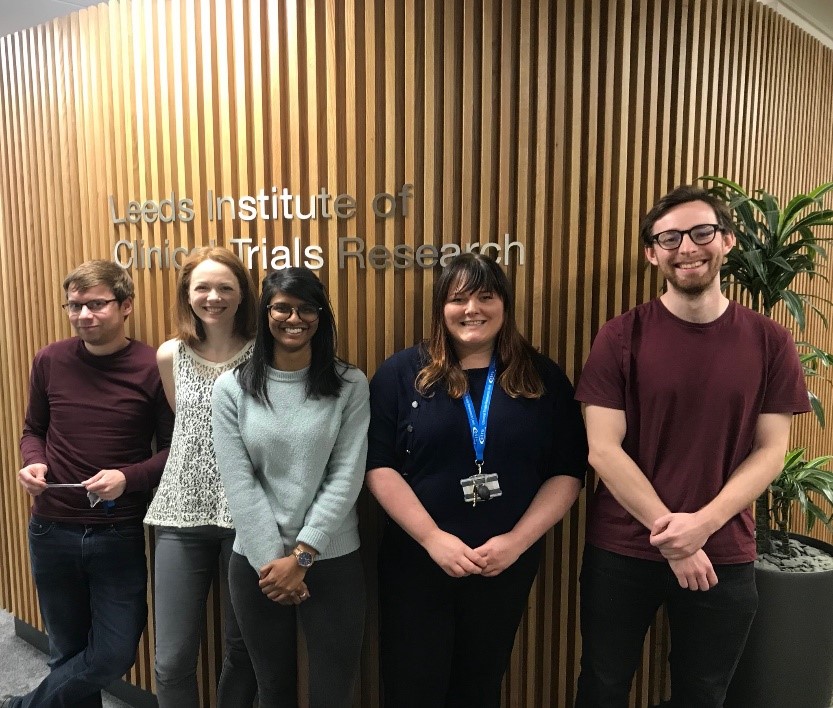ATLANTIS Meet the Team

Meet the Team
CHIEF INVESTIGATORS

Professor Alexander Ford, University of Leeds
Co-chief Investigator
I am co-chief investigator (CI) for ATLANTIS, a national study that is investigating amitriptyline as a second-line treatment for people with irritable bowel syndrome in primary care. We want to know whether the drug is better than a placebo for treating irritable bowel syndrome in this setting, and what patients and doctors perceptions of taking and prescribing it are. We have brought together a highly skilled mix of people to help run the study, including people living with IBS, patient and public involvement experts, qualitative researchers, health economists, statisticians, psychiatrists, GPs, and gastroenterologists.
I am an academic gastroenterologist, based in Leeds, and conduct research into how best to manage irritable bowel syndrome. As co-CI I am responsible for the design of the trial, and ensuring it is run according to ethical standards, and on time. I am very excited about taking part in what is sure to be an exciting, and important, research study.

Professor Hazel Everitt, Professor of Primary Care Research,
University of Southampton
Co-chief investigator and Wessex Hub lead GP
I am a clinical academic GP, based in Southampton, with an expertise in undertaking clinical trials in primary care. I have a specialist interest in improving the management of irritable bowel syndrome in primary care and have previously undertaken large clinical trials looking at the management of IBS. As co-CI I am leading on ensuring effective and efficient recruitment of patients with IBS from our three primary care recruitment hubs.
We have a great multidisciplinary team who are working together to successfully develop and deliver this large multicentre trial. The results will provide important new high quality research evidence for patients and clinicians to better inform our decisions on how to manage ongoing IBS symptoms which can have a great impact on peoples lives.
For more information on Hazel Everitt please see her staff page:
https://www.southampton.ac.uk/medicine/about/staff/hae1.page
CLINICAL COLLABORATORS

Dr Matthew Ridd, University of Bristol
West of England Hub Lead GP
I am the principal investigator for the Bristol hub of ATLANTIS, meaning I’m responsible for participant recruitment in the West of England area. I’m an academic GP based at the University of Bristol, where we’ve ran lots of trials in collaboration with our GP surgeries, supported by the Clinical Research Network.
I see lots of people in my GP surgery with IBS, so it’s great to be part of a trial, finding out whether an old treatment (amitriptyline) can help patients in new ways.
For more information on Matthew Ridd please see his staff page: http://www.bristol.ac.uk/social-community-medicine/people/matthew-j-ridd/index.html

Dr Sarah Alderson,
Clinical Lecturer in Primary Care, University of Leeds
Recruitment Co-Lead
My role in ATLANTIS is to provide Primary Care Expertise and I am Co-Lead for West Yorkshire Recruitment for the ATLANTIS study.
I am a clinical academic general practitioner, based in Leeds. My current research looks at mental and physical disease co-morbidity and understanding behaviour and behaviour change in order to embed interventions targeting patients and professionals within primary care, particularly the use of audit and feedback interventions to improve the quality of primary care prescribing.
For more information please see my University of Leeds staff page: https://medicinehealth.leeds.ac.uk/medicine/staff/73/dr-sarah-alderson

Professor Robbie Foy
Professor of Primary Care and Yorkshire hub co-Lead GP
Robbie is a general practitioner in Leeds and Professor of Primary Care at the Leeds Institute of Health Sciences. His field of work, implementation research, aims to inform policy decisions about how best to use resources to improve the uptake of research findings by evaluating approaches to change professional and organisational behaviour.
Robbie’s role in Atlantis is to support recruitment of practices and patients in West Yorkshire, as well as provide methodological advice. As a general practitioner, he regularly encounters people with irritable bowel syndrome and would welcome high quality research evidence to support people with this common and sometimes distressing condition.
Robbie was formerly a Clinical Senior Lecturer (Newcastle University) and an MRC Training Fellow in health services research (Universities of Edinburgh and Aberdeen). He also trained as a public health physician. He was a 2006–7 Harkness/Health Foundation Fellow in Health Care Policy, based jointly between the Veteran’s Administration and RAND in Los Angeles. He was formerly Deputy Editor-in-Chief of the open access journal, Implementation Science.
QUALITATIVE LEAD

Dr Felicity Bishop, University of Southampton
Qualitative Lead
I am a qualitative and mixed methods researcher, and I’m leading the qualitative aspects of the Atlantis study. A really important part of this study is finding out what patients think and feel about taking the study tablets. We also want to know about doctors’ experiences. To do this, we are talking to patients and doctors at various times in the trial and using qualitative research methods to collate and make sense of the multiple viewpoints that we expect to find.
My role is to design the procedures we will use to collect and analyse this data and to supervise a specialist researcher to do this work. By exploring patients’ and doctors’ perspectives in depth we hope to be able to understand some of the broader personal and interpersonal aspects of managing Irritable Bowel Syndrome.
We also hope to better understand how, if the study shows it is helpful, we might encourage doctors to consider amitriptyline as an option. I’ve led qualitative research in other studies on Irritable Bowel Syndrome, and I’m really excited to continue working on this topic in Atlantis.
PATIENT AND PUBLIC REPRESENTATIVES
Leeds IBS Support Group
We are working closely with members of a patient led IBS Support group. The group was set up over seven years ago to share best practice and support between patients with IBS. They continues to work closely with healthcare professionals and aim to provide a forum for discussion about IBS, without stigma. http://www.letscureibs.com/
 Patient and Public Representative, IBS support Group Leader”/>
Patient and Public Representative, IBS support Group Leader”/>
Mr Matthew Chaddock
Patient and Public Representative
IBS support Group Leader
WI provide first hand advice, having had IBS for several years and I am determined to help other IBS patients improve their condition through a combination of self-help and encouraging working closely with healthcare professionals. I feel passionate about ensuring patient involvement in clinical trials like ATLANTIS to ensure they benefit IBS patients and deliver innovative research.
THE CENTRAL COORDINATING TEAM

Leeds Institute of Clinical Trials Research,
University of Leeds
Left to right: Chris Taylor (Data Manager), Heather Cook (Senior Trial Manager), Taposhi Nath (Trial Co-ordinator), Suzanne Hartley (Head of Trial Management), Richard Brindle (Statistician)
Hello and thanks for visiting the ATLANTIS trial page! We are based at the Clinical Trials Research Unit (CTRU) at the University of Leeds and work with the investigators, GPs and patients to implement and deliver the ATLANTIS trial. We are responsible for the central management and monitoring of the trial, and we will analyse the data at the end of the trial.
On a day-to-day basis, this includes ensuring the trial is delivered in accordance with ethical and regulatory regulations, participants receive their trial medication, and high quality data is recorded to answer the research questions. We monitor trial performance in accordance with key milestones, and try to ensure the trial is delivered to time and target, and on budget.
Through our research, we are passionate about improving the quality of patients’ lives. We are excited to be involved in the ATLANTIS trial as it will allow patients to gain access to treatment which may not routinely be available, and therefore has the potential to shape clinical guidelines.

 Leeds IBS Support Group”/>
Leeds IBS Support Group”/>